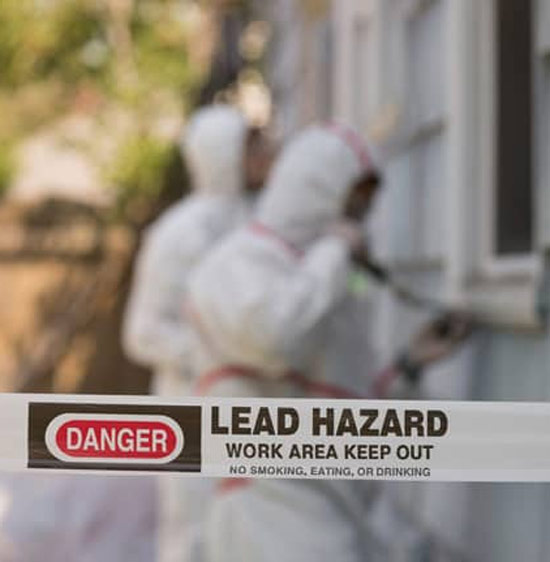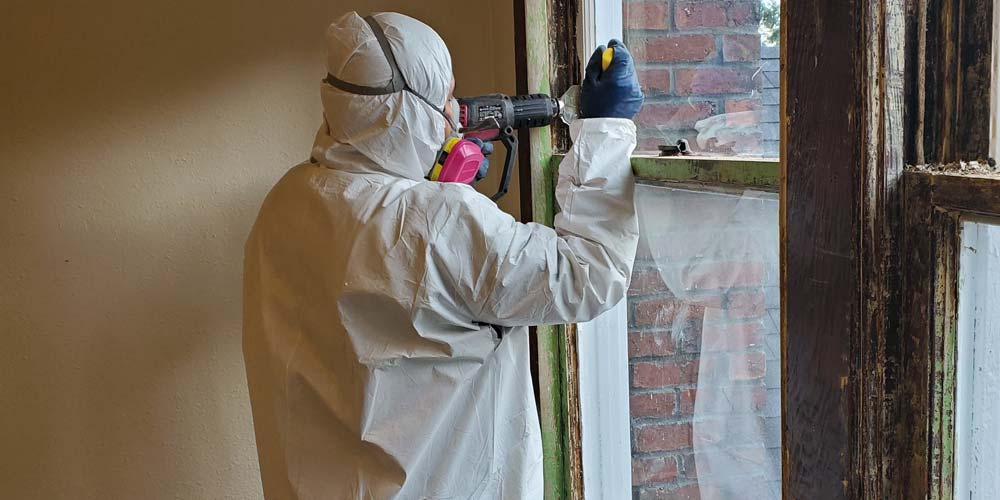Professional Lead Paint Removal Company-- Serving All NYC Boroughs
Professional Lead Paint Removal Company-- Serving All NYC Boroughs
Blog Article
Finest Practices for Ensuring Safe and Comprehensive Lead Infraction Abatement
Dealing with lead infraction abatement calls for a multi-faceted technique to guarantee both safety and security and conformity. Preliminary analyses making use of advanced discovery approaches such as XRF analyzers established the phase for a specific understanding of contamination degrees. Incorporating correct control methods, including impermeable barriers and HEPA purification, paired with using personal safety tools (PPE) for employees, forms the backbone of a safe and secure operation. Careful cleaning procedures, featuring HEPA vacuuming and wet-wiping, are vital. It's the last clearance process, involving extensive inspections and research laboratory testing, that absolutely validates a lead-free atmosphere, making certain long-term security. Exactly how do these methods interconnect to assure thorough lead abatement?

Initial Assessment
Carrying out a preliminary evaluation is a crucial very first action in lead offense abatement. This phase includes a thorough assessment of the residential or commercial property to identify the visibility, level, and specific locations of lead-based threats. Qualified experts, such as qualified lead examiners or run the risk of assessors, need to do a thorough site inspection, utilizing tools like X-ray fluorescence (XRF) analyzers to accurately find and measure lead concentrations in paint, dust, dirt, and water.
The analysis has to additionally consist of an evaluation of the building's history, previous records, and any kind of grievances or health issues reported by occupants - Lead Removal Contractors. Documenting the findings diligently is important, as these documents create the basis for developing an efficient abatement method. A complete evaluation additionally includes tasting and lab evaluation, which are important to validate the presence of lead and guide succeeding activities
Moreover, it is critical to interact the outcomes transparently to all stakeholders, including homeowner, renters, and regulatory authorities. By guaranteeing that the preliminary evaluation is conducted with accuracy and roughness, specialists can lay a solid foundation for a targeted and reliable lead abatement process, eventually securing public wellness and making sure conformity with governing requirements.
Proper Control
Correct containment is critical to avoid the spread of lead impurities throughout abatement activities. Effectively handling containment reduces the threat of lead dirt and particles migrating to non-work areas, consequently guarding both the environment and people outside the prompt job zone.

Normal inspections of the control area are necessary to look for violations or weaknesses in the obstacle. Any type of recognized problems need to be quickly dealt with to preserve the honesty of the control. By adhering to these techniques, abatement tasks can efficiently regulate lead contamination and mitigate associated wellness risks.
Worker Protection
Guaranteeing worker defense is paramount during lead reduction jobs to avoid work-related exposure to harmful lead bits. Essential steps consist of using individual safety equipment (PPE) such as respirators, handwear covers, and full-body suits particularly created to obstruct lead dirt and fumes. Workers ought to undergo extensive training Look At This on the appropriate usage and maintenance of PPE, consisting of fit testing for respirators to guarantee maximum effectiveness.
Design controls, such as local exhaust ventilation systems, are essential in minimizing air-borne lead concentrations in the work setting. Management controls ought to additionally be implemented, consisting of restricting the period of exposure and rotating workers to minimize private exposure times. Routine medical surveillance and organic monitoring are important for early detection of lead absorption, enabling timely treatment and treatment.
Additionally, developing a decontamination protocol is vital. Employees should adhere to strict purification procedures prior to breaks and at the end of their shift to avoid lead dirt from being brought outside the workplace. This consists of detailed hand and face washing with lead-specific cleaner and changing out of infected garments.
Precise Cleaning
Preserving a secure job setting prolongs past worker protection and encompasses precise clean-up to guarantee lead fragments are completely removed from the website. The procedure of careful clean-up is vital in protecting against the recontamination of the mellowed out area and guarding both current and future owners.
To attain a detailed cleanup, all workspace must be methodically sanitized. This involves making use of specialized HEPA (High-Efficiency Particulate Air) vacuum and wet-wiping methods to capture and eliminate fine lead dust that might have chosen surface areas. It is important to cleanse all straight surface areas, consisting of floorings, home window sills, and kitchen counters, in addition to vertical surfaces that might have caught lead fragments.
Workers should use suitable personal safety tools (PPE) during cleanup to prevent direct exposure to residual lead dirt. Used cleaning products such as wipes, sponges, and mop heads ought to be gotten rid of according to unsafe waste disposal policies.

Last Clearance
Last clearance is the essential ending stage of lead abatement that figures out whether the website is secure for reoccupation. This critical action includes extensive assessment and screening to verify that all lead risks have actually been efficiently gotten rid of. The procedure begins with an aesthetic assessment by a licensed lead-based paint inspector or risk assessor to ensure no noticeable dirt or debris continues to be. This is adhered to by gathering dust wipe samples from numerous surface areas, consisting of floorings, windowsills, and other straight surface areas. Lead Removal Contractors.

Last clearance testing not only safeguards future occupants but likewise makes sure conformity with neighborhood, state, and federal laws. It serves as a recorded validation of official source the abatement professional's adherence to industry best techniques. Ensuring a detailed and effective last clearance is necessary in protecting public health and wellness and promoting rely on the abatement procedure.
Conclusion
Guaranteeing secure and extensive lead offense abatement requires a complex method including initial analyses with sophisticated discovery methods, efficient containment methods, rigid employee protection methods, and precise cleanup treatments. The last clearance stage, including comprehensive examinations and research laboratory screening, is critical to confirm compliance with EPA standards. Adherence to these best techniques ensures a risk-free setting for owners, alleviates wellness threats, and supports regulative needs, therefore promoting public health and wellness and safety and security in lead-affected areas.
Report this page